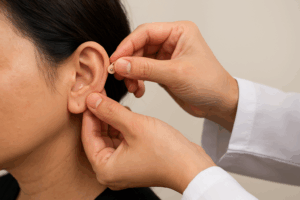Insomnia is a condition characterized by persistent difficulties in falling or staying asleep. It affects many individuals and leads to daytime fatigue, mood disturbances, and decreased productivity. While conventional treatments often involve medications, acupuncture is a cornerstone of Traditional Chinese Medicine (TCM) that offers a natural alternative to improve sleep quality.

Understanding Insomnia from a TCM Perspective
In TCM, insomnia is often attributed to imbalances in the body’s energy flow, also known as “Qi,” and disruptions in the harmony of yin and yang. Factors such as stress, anxiety, and poor lifestyle habits can obstruct the flow or deplete Qi and Yin, which leads to sleep disturbances. Acupuncture aims to restore balance by stimulating specific acupoints. This process promotes relaxation and improves sleep.
How Acupuncture Addresses Insomnia
Acupuncture involves the insertion of fine needles into specific points on the body to regulate the flow of Qi. For insomnia, acupuncturists often target points that are associated with calming the mind and nourishing the heart.
- Shenmen 神门 (HT7) is located on the wrist, nearer to the side of the last finger. This point is known as the “Spirit Gate” and is commonly used to alleviate anxiety and promote restful sleep.
- Anmian 安眠 is situated behind the ear. This point translates to “Peaceful Sleep” and is specifically used to treat insomnia.
By stimulating these and other related points, acupuncture helps to regulate neurotransmitters and hormones that are involved in the sleep-wake cycle. This process facilitates better sleep quality.

Benefits of Acupuncture for Insomnia
Several studies have highlighted the potential benefits of acupuncture in treating insomnia.
- Improved Sleep Quality is one of the main benefits. Patients often report enhanced sleep efficiency and deeper rest following acupuncture treatments.
- Reduced Sleep Latency is another advantage. Acupuncture may decrease the time it takes to fall asleep, which helps address issues of prolonged sleep onset.
- Minimal Side Effects make acupuncture a safe option. Unlike some sleep medications, acupuncture is associated with fewer adverse effects, which makes it a viable option for long-term management.
Integrating Acupuncture into Your Sleep Routine
For those who are considering acupuncture for insomnia, it is essential to consult with a registered TCM physician or acupuncturist to develop a personalized treatment plan. Consistency is important because regular sessions over several weeks may be necessary to achieve optimal results.
Incorporating acupuncture into your holistic approach to sleep health can address the root causes of insomnia. This approach promotes natural and restorative sleep.
Experience Better Sleep with Acupuncture
If you are struggling with insomnia and looking for a natural and effective solution, acupuncture may be the answer. Our experienced TCM physicians can help you restore balance and improve your sleep quality. Book a consultation today and take the first step towards better rest and well-being.











